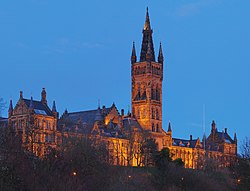This article has multiple issues. Please help improve it or discuss these issues on the talk page . (Learn how and when to remove these messages)
|
The Principal of the University of Glasgow is the working head of the University, acting as its chief executive. They is responsible for the day-to-day management of the university as well as its strategic planning and administration. The Principal is appointed by the University Court and is President of the Senate, the university's supreme academic body. The Principal is normally also created Vice-Chancellor of the university, conferring on them the degree-awarding powers of the Chancellor.
Contents
Professor Andy Schofield succeeded Sir Anton Muscatelli as Principal on 1 October 2025 [1]

